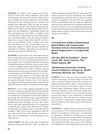
Search
for
Sort by
Research
630-660 / 773 results

research Benign Cutaneous Eruptions After Transplantation
Transplant patients often get skin problems, with treatments varying by condition.

research Expression Patterns of the Siah Genes in Postnatal Mouse Skin
The Siah1 and Siah2 genes are active in mouse skin development and hair growth, especially right after birth.

research Tissue and Circulating MicroRNA Co-Expression Analysis Reveals Potential Involvement of miRNAs in the Pathobiology of Frontal Fibrosing Alopecia
Certain miRNAs might be involved in a hair loss condition called frontal fibrosing alopecia and could possibly help in its diagnosis.

research Establishment and Characterization of Human Sebocytic Progenitor Cells That Can Differentiate Into Functional Sebocytes
Researchers created human cells that can turn into sebocytes, which may help study and treat skin conditions like acne.

research Abstract 82
Fetal scalp cells have more regenerative genes than adult cells, and decellularized muscle matrix is better for muscle repair than commercial alternatives.

research Disorders of the Skin Appendages
The document concludes that proper recognition and treatment of skin appendage disorders are important for management.

research Diagnosis and Treatment of Alopecia Areata
The document says how to diagnose and treat hair loss from alopecia areata, but there's no cure and treatments vary.

research II Nanosciences and Nanotechnology Biomedicals Symposium - Proceedings
Nanotechnology shows promise for better drug delivery and cancer treatment.

research Immunology and Genetics
The document concludes that Borrelia afzelii causes a skin condition in France, a gene is linked to hair loss in Caucasian women, and various genetic mutations affect skin diseases.

research Obstetric Dermatology
The document concludes that managing skin conditions during pregnancy is important and requires specialized care.

research Alopecia
Alopecia areata is a reversible, autoimmune-related hair loss that can have significant emotional impact and uncertain treatment effectiveness.

research Abstracts
Mice treatments didn't grow hair, a patient treatment may affect immune response, and people with hair loss often feel anxious or depressed.

research CME Examination for Volume 43
The exam tested knowledge on various skin-related topics for CME credit.

research Annotated Patent Selections
The document highlights various patents for new compounds with potential treatments for multiple diseases, including cancer, hormonal disorders, and diabetes.

research Psoriasis
Psoriasis treatments range from topical creams to systemic medications with serious side effects, and while treatments can manage symptoms, there is no cure.

research Cutaneous Manifestations of Systemic Infection in Children
Skin symptoms are important for diagnosing infections in children.

research Cutaneous Signals of Immune System Disease
Skin issues can indicate immune system problems.

research Is EBF1 a Negative Regulator of WNT10A in the Development of Androgenetic Alopecia?
Finasteride helps female-pattern hair loss.
research Prevention of Murine Sclerodermatous Chronic Graft-Versus-Host Disease by Rapamycin
Rapamycin increased survival in mice with severe chronic graft-versus-host disease by expanding regulatory T cells.
research Application of Topical Immunotherapy in the Treatment of Alopecia Areata: A Review and Update
Topical immunotherapy can treat alopecia areata, but its effectiveness varies and the exact mechanism is unclear.
research Birth, Life, and Death of the MAGE3 Hypothesis of Alopecia Areata Pathobiology
The MAGE3 hypothesis for alopecia areata did not lead to a significant breakthrough.
research Advanced Understanding and New Treatments for Alopecia Areata
New treatments for the autoimmune hair loss condition alopecia areata may include JAK inhibitors and other immunomodulators.

research IL-15/IL-15Rα Signaling Is a Guardian of Human Hair Follicle Immune Privilege and Promotes Hair Growth
IL-15 promotes hair growth and protects hair follicles.

research Environmental Pathobiology of Frontal Fibrosing Alopecia: Does Linalool Promote FFA Development and Progression?
Linalool in personal care products may contribute to hair loss by damaging hair follicle stem cells and triggering harmful immune responses.
research Latest Understanding and Treatment of Alopecia Areata
New treatments for alopecia areata, like JAK inhibitors and immunomodulators, are promising.
research Four Independent Mutations in the Feline Fibroblast Growth Factor 5 Gene Determine the Long-Haired Phenotype in Domestic Cats
FGF5 gene mutations cause long hair in domestic cats.
research The PDE4 Inhibitor, Apremilast, Suppresses Experimentally Induced Alopecia Areata in Human Skin In Vivo
Apremilast may help treat hair loss in alopecia areata.
research Human Leukocyte Antigen Class II Alleles Are Associated with Risk of Alopecia Areata
Certain HLA class II alleles increase or decrease the risk of alopecia areata.
research Serum Granulysin as a Possible Key Marker of the Activity of Alopecia Areata
Serum granulysin levels can indicate the activity and prognosis of alopecia areata.